Written by Eric Zuesse
Reuters published on January 11th a 6,000-word “SPECIAL REPORT: How Russian officials and their collaborators spirit away Ukraine’s children” that searched in Ukraine to find evidence on the basis of which Vladimir Putin should be convicted by the International Criminal Court as a war-criminal for Russia’s “abducting” and mistreating children in Ukraine, and Reuters interviewed Ukrainians who support the ICC’s investigation to find such evidence, but their team did not go behind the allegations from those anti-Russian sources, and merely reported those allegations, none of which clearly indicate even a single war-crime by, or on behalf of, Russian forces and officials. And, so, Reuters’ having publishing that article makes little, if any, sense, except possibly as a propaganda-exercise for the U.S. and its colonies (‘allies’) (including for the government that the U.S. installed in Ukraine in 2014).
The Reuters team consisted of one reporter in Kherson (Ukraine), another in New York City, two reporters in London, and a photographer who went along with the Kherson reporter. The content of their report alleged that Russia has removed from Ukraine institutionalized children who were in the war-zone and that Russia has provided Russian foster homes for the children who were in orphanages there, and for a few children who were in other facilities, but the only complaints that they report against the Russians who were involved in that relocation of institutionalized children out of the war-zones came from pro-Ukrainian anti-Russian children whom Russia returned to Ukrainian custody. The Reuters reporter also described hostilities between, on the one hand, the children who chose to and did return to Ukrainian custody, and, on the other, the children who instead chose to and did remain in Russian-controlled areas and to accept the financial and other support, health care, and maintenance, that Russia is supplying to them.
Following here are excerpts from (45% of) that Reuters news-article, in order to exemplify each of the points that has been stated here:
Early last year, teachers at a school in Russian-occupied southern Ukraine announced the arrival of a very special guest from Moscow.
Many of the pupils at the Henichesk Number 27 Vocational School were orphans or separated from their families. Among them were Liza Batsura and Zorik Ibrian, both 16 and from Kherson. …
The woman … was Maria Lvova-Belova, Russia’s commissioner for children’s rights. …
“I’ve got my mother, but as far as they were concerned, I was an orphan,” Liza told Reuters several months later. “They wanted to issue a Russian passport for me and find me a family, a Russian family.”
Last March, the International Criminal Court issued arrest warrants for Lvova-Belova and her boss, Russian President Vladimir Putin, on charges of illegally deporting children from Ukraine. The court said in a statement it has “reasonable grounds” to believe both bear individual criminal responsibility for acting “directly, jointly with others and/or through others” and that Putin, as president, also has command responsibility. …
Russian President Vladimir Putin and Presidential Commissioner for Children’s Rights Maria Lvova-Belova.
The ICC’s chief prosecutor said Russia transferred “at least hundreds” of children from orphanages and care homes in occupied regions of Ukraine, and “many” have been given up for adoption. Ukrainian authorities say Russia has removed more than 4,000 children who are orphaned or not in parental care. …
The Kremlin and Lvova-Belova say Russia has moved children to protect them from war and that wherever possible did so with the consent of parents or guardians. A Putin spokesman denounced the ICC charges as “outrageous and unacceptable.”
Some of the missing children have been recovered. Among them is Liza, now safely back in Ukraine thanks to her mother, Oksana Halkina, who traced her to Henichesk and brought her home last May. Most accounts that have emerged of Russia’s mass movement of Ukrainian children have come from returnees like Liza.
Other children from Kherson who were living at the college in Henichesk, however, remain in Russian hands. They include Liza’s schoolmate Zorik, and Zorik’s brother Danylo, who were orphaned in 2021.
Reuters reporters have spent six months investigating the fates of missing Ukrainian children who have no relatives to advocate for them because they are orphans or are otherwise separated from their families. …
Ukrainian prosecutors told Reuters they are conducting pre-trial investigations into the illegal transfer and deportation of Ukrainian children in occupied territories and their adoption by Russian families. …
By interviewing dozens of witnesses to their deportations and reviewing social media and Russian news reports, Reuters has identified Zorik, Danylo and three other teens who were removed from Kherson together with Liza. All five — whose parents are dead or unable to care for them — are still in Russian-held territory with the support of the Russian state, with little prospect of returning to Ukraine.
Reuters also traced the journeys of 48 much younger orphans from Kherson, aged five years or less at the time of their removal. This group is at the heart of separate abduction charges brought by Ukrainian prosecutors against three unnamed individuals – a Russian and two Ukrainians. …
The removals of Ukraine’s children are supported by a vast machinery to deport, house and re-educate. Reuters found that a network of pro-Kremlin actors and helpers was involved in taking the two groups of orphans from Kherson: Lvova-Belova, members of the Russian parliament, officials in Russian-occupied Crimea and Ukrainian doctors and teachers who chose to collaborate with Russian authorities. …
Almost all have been “brainwashed,” said Mykola Kuleba, head of Save Ukraine, a nonprofit organisation that helps to retrieve Ukrainian children from Russian-controlled territory. …
In the days before Russia launched its full-scale invasion of Ukraine on Feb. 24, 2022, Liza was among a group of children celebrating Valentine’s Day in the Children’s Centre for Social and Psychological Rehabilitation, an orphanage on the outskirts of Kherson. …
Volodymyr Sahaidak, the director of the orphanage, … began looking for ways to shield the 52 children in his care. …
When it became clear that Ukrainian forces were far from retaking Kherson, Sahaidak began contacting relatives of the children, begging them to take them in. …
Among those who were claimed by their relatives were the two younger siblings of Zorik and Danylo. Their mother had died suddenly a year earlier and the four children had been waiting for their adult half-brother to adopt them. …
In April 2022, the mother’s cousin, Oleksandr Ponomarchuk, and his wife Alla, received an urgent call from Sahaidak about the children.
“Sahaidak called us and said the situation is dire. They (Russian soldiers) are taking children from Kherson,” Oleksandr said.
He and his wife, who have two children of their own, decided to take in the two younger siblings, Danyila and Imir, but told the director they couldn’t take the older boys. Russian soldiers were stopping and questioning young men in occupied Kherson, and Oleksandr told Sahaidak he was not sure if he could keep the older boys safe. …
Russian soldiers began visiting the orphanage in June. One of their visits was captured on the orphanage’s CCTV camera system: Soldiers in masks carrying automatic weapons are seen walking through the corridors, accompanied by a man with a bushy beard. That man, orphanage director Sahaidak said, was Georgy Tambovtsev, newly-appointed by the Russian occupation as the deputy head of youth, family and sports. According to his social media, Tambovtsev coaches freestyle wrestling. …
Tambovtsev began regularly dropping into the centre to check on the children. So did several Russian officers, their faces always covered. …
Liza said that she and the boys were taken by one of their teachers and other school staff 250 kilometres away to a large camp in Crimea called “Druzhba,” friendship in Russian, where they were forced to follow a strict schedule of meals and physical exercise. Any child who disobeyed or showed any allegiance to Ukraine would be threatened with a beating, Liza said.
“One thing that they taught us was that our parents won’t come to pick us up from there,” she [Liza] said, reciting the message drilled into them by the camp’s directors and staff. “They won’t be able to because we’re not their children anymore.” The kids now belonged to the Russians, “and our parents don’t need us.”
Liza’s description of the Crimea camp is in line with testimonies from other repatriated children who passed through similar facilities, according to Save Ukraine. …
The darkened corridors of the orphanage are quiet now, except for the occasional boom of nearby artillery strikes. The children are long gone, and most of the staff have also fled. …
Five kilometres south of the orphanage, tucked behind the main thoroughfare that leads to the centre of Kherson, Ukrainians were trying to hide another group of children from the conflict.
From late February until the end of April 2022, Pastor Pavlo Smoliakov sheltered 58 toddlers and infants in the basement of his local Baptist church. The children came from the Kherson Regional Children’s Home that lies close to the Dnipro River.
Among the children in the home’s care were twin girls Diana and Svitlana Berenzon. They had been in care since birth because social workers were concerned that their family home did not have proper heating or adequate furnishing. …
Russian soldiers found out about the children in the church basement and began stopping by to check on them. The Russians claimed they were suspicious about what the Ukrainians intended to do with the toddlers, Pastor Smoliakov said. …
At the end of April, a man who called himself the “Navigator,” flanked by armed soldiers, ordered Smoliakov to transfer the children back to the Kherson Regional Children’s Home. Smoliakov complied.
The Russian authorities then fired the director of the home because she refused to cooperate with the occupiers. They appointed a local paediatrician named Tetiana Zavalska in her place. Zavalska later took part in a Russian state TV documentary that sought to portray Moscow’s rule in Kherson as benign. …
By fall of 2022, Ukraine’s armed forces were steadily advancing towards Kherson. Tens of thousands of Russian troops began retreating to the left bank of the Dnipro River. Russian-installed officials made preparations to evacuate some of the civilian population.
There were now 48 children in the Regional Children’s Home.
In late October 2022, the 46 remaining youngsters were taken by the Russians from the Regional Children’s Home. …
The clip, from Oct. 21, 2022, shows Igor Kastyukevich, a member of the upper house of the Russian parliament, holding a child named Ivan Batyhin in a lilac puffer jacket. Ivan and other infants and toddlers, bundled up in colourful outfits, are seen being carried onto a bus marked with the Russian war symbol Z. The buses were sent in by the Russian occupation authorities in Crimea, according to a volunteer from Crimea who accompanied the children. …
The buses drove 280 kilometres away to the district of Simferopol, Crimea. Most of the children were placed in a specialised orphanage for youngsters with psychological and nervous disorders. Its name, “Yolochka,” means Christmas tree in Russian. Around a dozen of the pre-schoolers are now housed in a Crimea sanatorium or a second orphanage for older children. …
One year on, in late September last year, the playground of the children’s home was eerily quiet, the ground covered with shin-high weeds and fallen leaves. A local man was still guarding the premises, walking aimlessly around the rusted swings even as nearby shelling occasionally shook the ground.
Zavalska, the collaborator installed by the occupation as home director, fled when Russian forces withdrew, according to the home’s pre-war head.
The toddlers mostly vanished from view after they were removed from Kherson. …
A Russian government adoption website published letters from children in an orphanage detailing what gifts they want from Santa. Reuters identified this child as Artem Poberezkyi, who went missing from Kherson in October 2022.
Reports in Ukrainian and independent Russian media have indicated that some of the 48 toddlers may have been taken to the Yolochka home. In interviews with six current and former Yolochka staff, Reuters has established that around 30 remained there as of November 2023. …
In late 2023, at least two of the children who had been at Opushki were moved to a third facility – an orphanage in the Crimean village of Strohonivka that looks after children aged between 3 and 7, according to a person involved in the care of the two children. Staff at the orphanage did not respond to a request for comment sent by Reuters.
None of the people Reuters spoke to at Yolochka, Opushki and the Strohonivka orphanage was able to say what was planned in the long term for the Kherson toddlers in their care.
When Reuters telephoned the deputy director of Yolochka, Vitaly Utkin, he complained that Reuters had been calling his staff. “Tomorrow I’m going to the police to file a complaint to stop this,” he said. …
Tanya Lokshina, an associate director for Europe and Central Asia at Human Rights Watch, said whatever Russian authorities have planned for the orphans in Crimea, it constituted a breach of international law to deport and hold them in Russian-controlled territory.
“The transfers and deportations of children are only possible under international law if there is a direct risk to their safety, if there’s a direct risk to their life and health, and only if it’s a temporary measure,” she said. “Russia has demonstrated no signs of willingness to return those kids except in individual cases where parents and guardians physically come to pick the children up.” …
According to the Ukrainian Commissioner for Human Rights, in a statement to Reuters, 386 children were returned as of the start of October 2023. …
By the time the teens met with Lvova-Belova early last year, many of them had already started believing that Ukraine would ultimately lose the war. The teens from Kherson were divided. One group was holding onto hopes of returning to Ukraine, while others saw their future in Russia and espoused pro-Russian rhetoric, Liza said. At times, some of the children oscillated between the two positions, which led to bitter arguments among them.
Nastia, a 16-year-old girl who spent several months at the school in Henichesk, recalled how the police were summoned after she sang the Ukrainian anthem and shouted “Glory to Ukraine!”
“The police came, and they threatened to sew our mouths shut,” Nastia said.
She was in the room with Liza when Lvova-Belova, the special guest, offered the students Russian passports. “She was like, select any college you’d like to go to in Moscow,” Nastia said.
Lvova-Belova told all the teens they would get 100,000 rubles (about $1,100) and an apartment when they turn 18 if they stayed in Russian-occupied territory, Nastia and Liza said.
“It was all pressure, and it worked,” Liza said.
Officials from Lvova-Belova’s office also offered boys in the group places at a prestigious Russian military academy, another student from Kherson who was at the Henichesk college said. Several of the boys have now received Russian passports, Liza said. …
Zorik and at least three other teens from the group spent part of last June in Russia-occupied Crimea, at a summer camp organised by Lvova-Belova’s office. In a social media post, she said the camp was for young people from the “new regions,” the term Russian officials use to describe occupied Ukraine. A slick promotional video posted online showed the teens in Zorik’s group visiting historic sites, playing on the beach and watching concerts. …
Sahaidak, the orphanage director in Kherson, still keeps tabs on his old students by watching their Russian TV appearances that are later reposted on social media. He believes that children like Zorik and Denys, who he remembers as one of his most promising students, are doing what they need to do to survive. …
Danylo, Zorik’s older brother, is now 19 and recently moved into his own apartment in the Krasnodar region of southern Russia. He is planning to marry his girlfriend, another orphan from Kherson. As promised, he received 100,000 rubles from the Russian state, said Oleksandr Ponomarchuk, guardian of Zorik’s two youngest siblings. …
After months of bouncing between camps and schools in occupied territory, Liza now lives with her mother in a hotel in Kyiv, which Save Ukraine has set up as temporary accommodation for families and children displaced by war. The building is crowded, and the constant wails of babies keep her up at night, Liza says. Sitting in a tranquil park near the hotel with her mother last October, Liza said she hopes they can move into a place of their own soon. …
—————
Investigative historian Eric Zuesse’s latest book, AMERICA’S EMPIRE OF EVIL: Hitler’s Posthumous Victory, and Why the Social Sciences Need to Change, is about how America took over the world after World War II in order to enslave it to U.S.-and-allied billionaires. Their cartels extract the world’s wealth by control of not only their ‘news’ media but the social ‘sciences’ — duping the public.



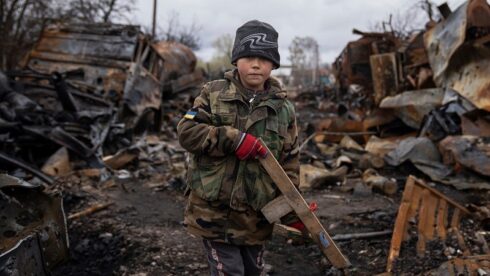
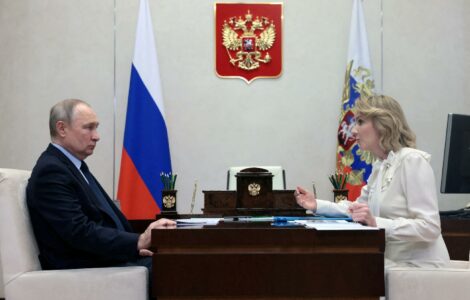
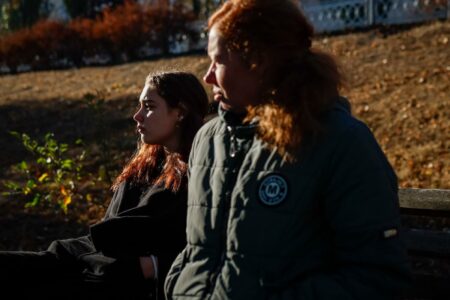
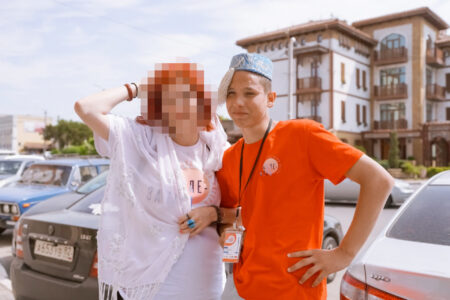
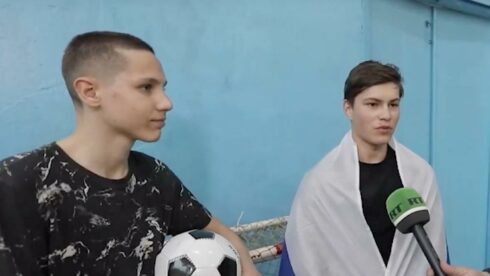



let’s see. “british”, or in actuality english swine purchased “reuters” many decades ago. listed on the lse from 1984.
simple question, why doesn’t “reuters” and the so-called icc investigate the absurd zelenska “charitable foundation” and their clinton backed pedophile clan activities?
why reuters didn’t look into israel or ukraine war crimes? or us, uk, france, nato as a whole when they were in afghanistan, iraq or syria? why is that…
the rules based order says crimes are only commited by the others.
well, that would directly interfere with the western narrative. it’s always the others that are the “bad guys”
they are all part of the us imperialist machine, smash the machine.
welp, another narrative debunked. how about they now investigate the “ukraine is winning” narrative for facts?
with reference: ‘special report’ by reuters to find war-crimes by russia in ukraine finds none”
basically if there is “nothing” in the first place then it will be impossible to find “anything”. infact it will be harder to find than a “needle in a haystack”. it took months of digging around by so-called investigators to find “nothing”, zilch, fuck-all.
“missing ukrainian children who have no relatives to advocate for them”?! surely “uncle” volodymyr has made getting missing ukrainian kids back a priority, no? come to think of it, why didn’t little vlodymyr move them out of harm’s way before the big bad russians could steal them?